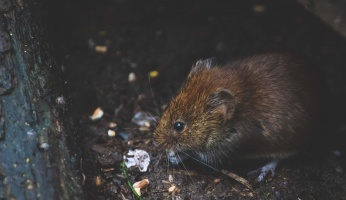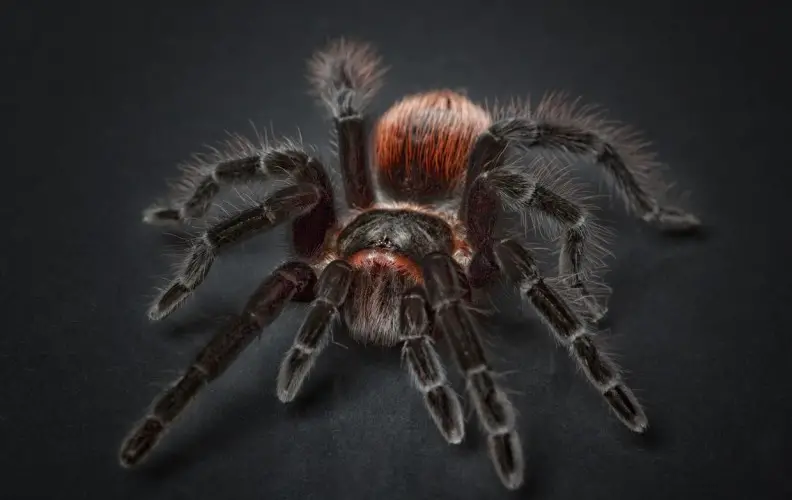Cat Anxiety: 10 Tricks to Try to Bring Calm to Your Feline
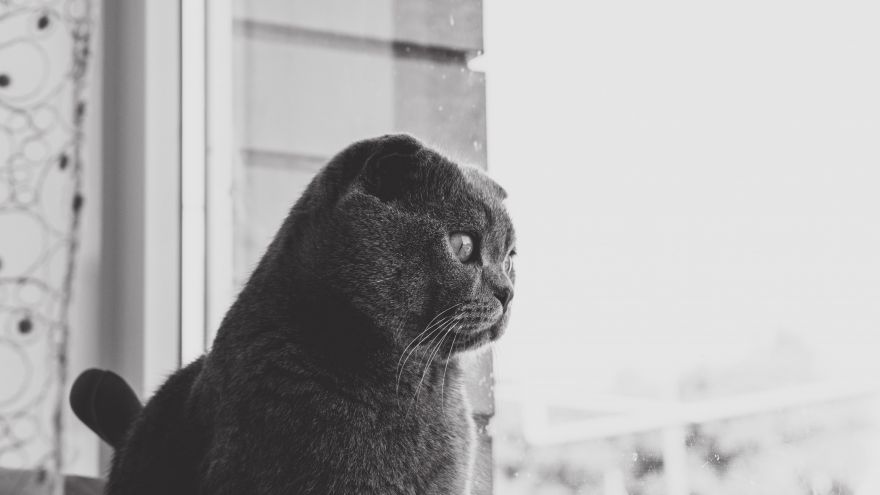 Cat Anxiety: 10 Tricks to Try to Bring Calm to Your Feline
thegearhunt.com
Cat Anxiety: 10 Tricks to Try to Bring Calm to Your Feline
thegearhunt.com
Fear and anxiety are something that cats and humans have in common, and all of us have experienced it at one time or another in our lives. If there is one thing that any cat owner will tell you, it’s that you don’t want to have to deal with a stressed-out cat in your home. There are many different causes of feline anxiety and believe it or not, cats actually have phobias as well. The trick is in how you handle your feline pal when he gets stressed, afraid, or feels anxious.
 While cats are something of a mystery to most people, after all, they are certainly their own little critters, which do their own thing and are highly intelligent, many of them can be skittish naturally. This is, of course, where the term “scaredy cat,” came from. Cats are creatures not only comfort but habit as well, so they really don’t like things to change in their little corner of the world. Being a little frightened is one thing, but there are times when that fear can turn into an outright phobia or feline anxiety…that’s when you know you have a problem on your hands and need to visit your vet. A scared cat is a dangerous cat, and any pet owner can tell you so. When they get scared, they become all sharp claws and even sharper teeth.
While cats are something of a mystery to most people, after all, they are certainly their own little critters, which do their own thing and are highly intelligent, many of them can be skittish naturally. This is, of course, where the term “scaredy cat,” came from. Cats are creatures not only comfort but habit as well, so they really don’t like things to change in their little corner of the world. Being a little frightened is one thing, but there are times when that fear can turn into an outright phobia or feline anxiety…that’s when you know you have a problem on your hands and need to visit your vet. A scared cat is a dangerous cat, and any pet owner can tell you so. When they get scared, they become all sharp claws and even sharper teeth.
Helping to an anxious cat
That is where this blog on cat anxiety and the tips you can use to calm down your pet comes in. In this blog, we will also delve into the causes for anxiety and cat phobias, the signs and symptoms you should watch for, and then the tips for how to calm your feline down in a pinch.
If you have a cat that you are worried about suffering from a phobia or an anxiety issue, join us on our journey to help calm your cat. Ready? Then, let’s get started.
Cat Anxiety and Cat Phobias: Are They the Same Thing?
While many people think that they are, phobias and cat anxiety are not the same things. Don’t worry, we will still touch on both, but note that they are defined differently.
Cat anxiety is often shown with long-term behavior, such as separation anxiety, which is being anxious when their owner is not home. These anxieties that they fear are different, in that this is normal behavior, while phobias are irrational fears.
For example, a cat jumping at a loud noise behind them is normal and they do it on instinct. A cat phobia is where the cat is afraid of a specific object or even a certain situation. See the difference?
One is just as difficult for the pet and the pet owner as the other, however, so we will deal with them both in our blog. Not the same thing, but they have the same outcome if you aren’t careful.
Now, that we know what cat anxiety and cat phobia is, let’s move on to the common causes of stress and phobias in cats.
Common Phobias in Cats
Common cat phobias are listed below
- Loud noises
- Quick movements
- Strange environments
- Events that are stressful
While this stuff may seem instructional and like a normal feline reaction, it’s when it turns into a fear of one specific thing that it becomes a problem and you need to get help for our feline companion.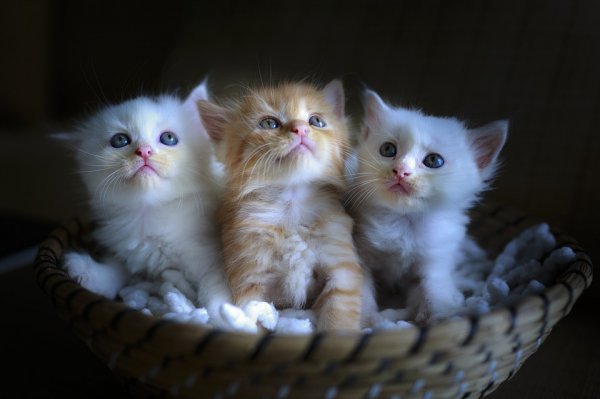
Common Causes of Anxiety in Cats
Now, that we have the phobias out of the way, it’s time to move into the true reason for this blog, cat anxiety, what it is, and how you can get help. Below, we will first go into the common causes of anxiety in cats to get us started on the path to keep them calm.
Strangers
Any cat owner can tell you that strangers and cats don’t mix. Especially, if these strangers become houseguests and your little darling doesn’t know them. This can cause untold anxiety for your cat, who will claw and scratch to get away from the stranger if they try to hold or pet them until they get used to them, if they ever do.
New Pets
Cats are, of course, solitary creatures who feel that they should be left alone when they want to be and be the center of attention when they don’t. They don’t do well when being introduced to new pets at all. It’s best to let your cat give the new pet, whether it’s a new cat or something else, a wide berth until it gets used to having someone else in its surroundings.
Objects that Are Unfamiliar
Older cat owners can tell you that inanimate objects can be frightening to cats, not scary per se, but if it’s large and new, your cat is going to be leery of it for a while and doesn’t need to be pushed to have anything to do with the object until they are ready.
Being Startled or Surprised
One of the biggest forms of cat anxiety for cats comes from being startled or surprised. Remember, everything after 10 inches off their face is a blur to cats, so if you put something to the side or come up on them fast, they are going to be startled and react with anxiety and fear.
Other Common Anxiety Causes with Cats
- Loud noises
- Spaces that are wide open
- Leaving their homes
- Being punished, which is the worst form of anxiety to a cat. Being hit, pushed or yelled at will send them cowering into a corner, so please don’t be mean to your animals.
These are the leading causes of anxiety in cats and while they don’t seem that bad, having an anxious cat that is scared is something that no cat owner wants to have to deal with. Instead, read on below for the signs and symptoms and then the tips to help you calm your pet, if you can’t get them to calm down, then it’s time to seek treatment from your vet.
Signs and Symptoms of Cat Anxiety
There are quite a few signs and symptoms out there that you can look for to see if your cat is suffering from feline anxiety. Join me to find out what those signs and symptoms are.
Your Feline Pal Hides Most of the Time
Of course, we all know that some cats are less social than others, most are at least social some of the time. If your pet hides so often, you are surprised when it comes out that you actually have a cat, then you need to have him seen by a vet.
Your Cat is Super Aggressive
If your cat is constantly destroying your stuff or attacking you, he could not only be anxious but bored as well. This is a sure sign of anxiety in a cat.
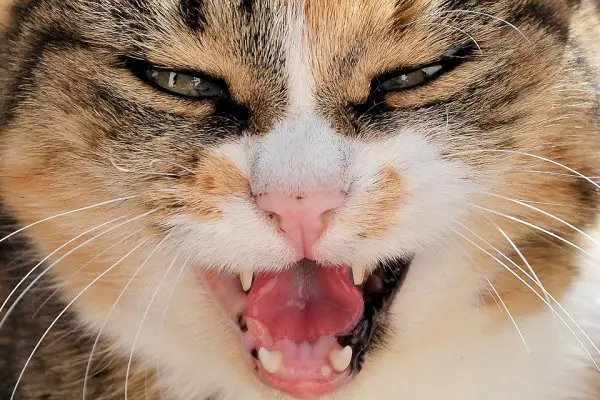
He Meows Constantly
Most cats meow to communicate to you that they are hungry or even that they want to be let outside. However, is you cat is constantly meowing, and often loudly, he may be trying to tell you something. Sometimes, this meow will sound disturbed and sad, then you know it’s time to give your cat some attention for sure.
Your Feline Friend Refuses to Use the Litter Box
If your litter box is clean, fresh and able to be used, then your little cat should have no problem jumping in there and using it. If he suddenly stops using the litter and uses other parts of your home instead, he may be anxious. First, rule out any possibility of a physical problem, then change the litter you use, if that doesn’t work change out the litter box. If he is still doing the same thing, it’s time to find out what is upsetting him.
He Can’t Seem to Stop Grooming Himself
If your cat is grooming himself so much that he is starting to lose his hair by the clumps, he is anxious about something and you need to find out what that something is.
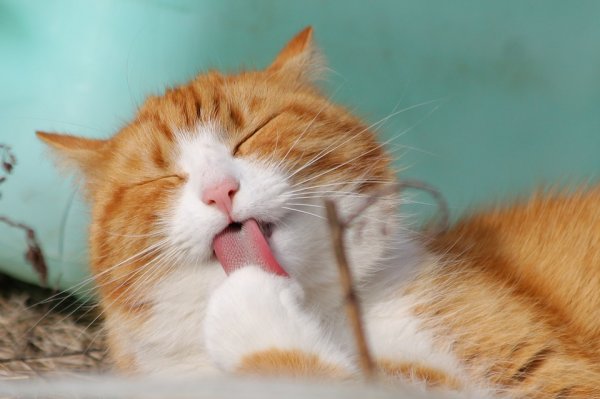 He Follows You Everywhere You Go
He Follows You Everywhere You Go
While many cats do have a habit of following their pet parent places, if it is excessive, then you might need to get the cat some help. Cats, just like dogs, can suffer from anxiety when they are separated from their pet parents. If your cat seems clingier than normal, you may need to spend more time with her.
The Cat is Trembling
As previously stated, cats are startled easily. However, if your cat gets to where she is constantly trembling, you need to see if you can find the root of the problem. Your feline friend may be overstimulated and just need a quiet space to chill for a while.
Top Tricks for Calming Your Feline Down
Now, that we know the signs and symptoms, it’s time to see what we can do to remedy the problem.
Be There, but Don’t Smother Your Feline
There is a difference in being there when your cat needs you and smothering them with love. A cat needs it’s on space and constantly being around it and trying to hold and pet it will make it more anxious than it already was.
Take it Slow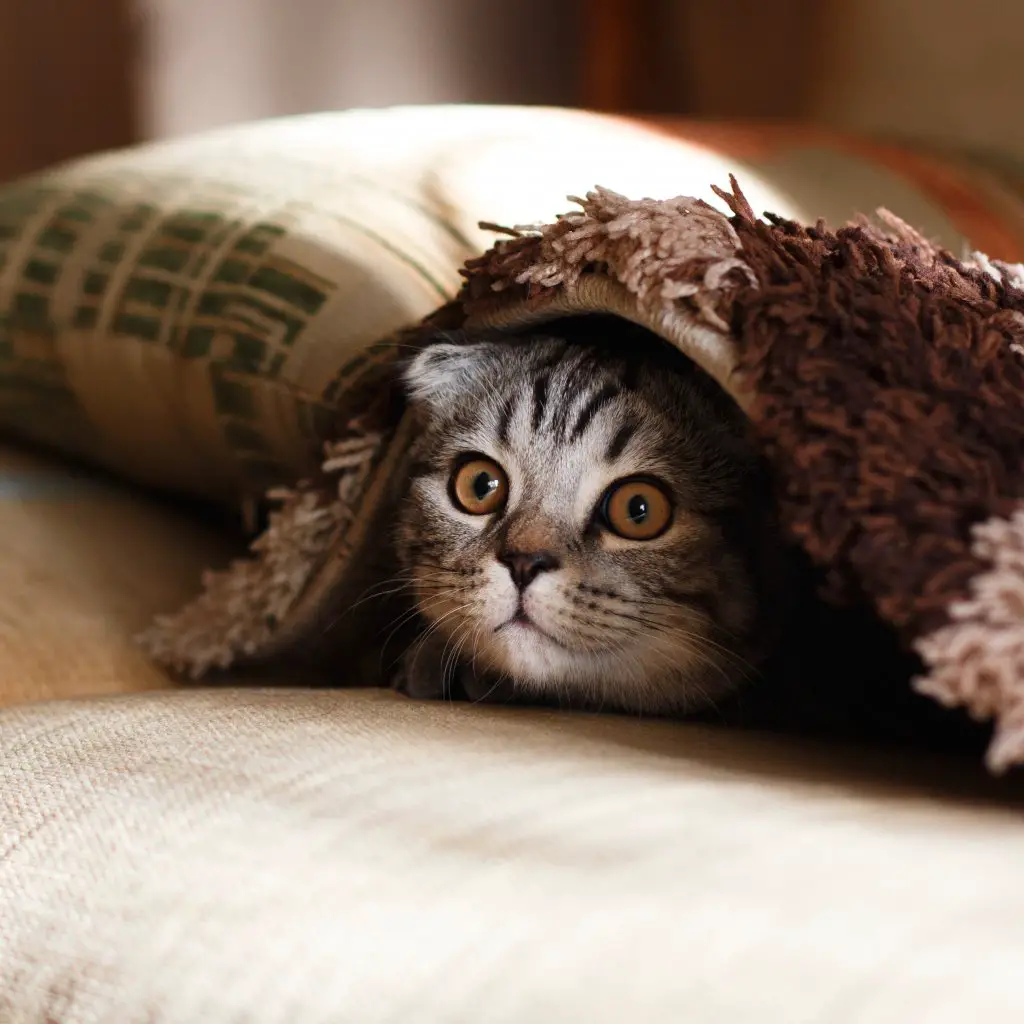
Cat’s get upset when there’s change, whether it’s moving to a new home or having a friend they’ve never seen come over for the day. Don’t try to force your cat to be friends or explore his new home, instead, take it slow and let him come to it in his own way.
Create a Safe, Cozy Place that is Vertical if Possible
Any cat owner can tell you, cats don’t like wide open spaces. They need to feel safe and cozy and be able to get away to their own space when they feel the need. When your cat is anxious have a place, one that is a vertical house if possible, that the cat can retreat to, to feel safe and be alone.
Keep Essentials in Reach
Whether it’s food, water, or the litter box, a cat is a creature of habit and will get anxious if things are moved or changed. Put the things your cat needs where they are comfortable with it being, not where you want it to be in your home. Cats are catcentric, which means there basic needs should be met where they need them to be met.
Spreading His Scent Helps
Cats have many ways that they spread their scents and it’s important to let them do that. Let them spread their scent in their favorite rooms, and make sure that they can get into those favorite rooms when they are upset to calm them down pretty quickly.
Use Essential Oils to Calm Him
A cat gives off their own musky scent, but there are other essential oils you can try that will help calm your agitated feline as well. Honeysuckle and lavender are great scents to help calm your kitty when he are anxious.
Use Soft Music and White Noise
Soothing music or white noise in your home is another way to ensure your cat stays calm or becomes calm when he is restless and anxious.
Supplements and Prescription Meds
While we all would prefer to not give our beloved cats any type of drugs, sometimes it can’t be helped. Of course, you need to visit your vet before you make any of these types of decisions.
These are just a few of the top tips that can help you calm your cat. Try them and if they don’t work please get help for your cat somewhere.
Sources
- PetMD: 10 Helpful Ways to Calm Your Cat
- Canna Pet: Cat Anxiety: A Comprehensive Guide
- The Spruce Pets: Common Causes of Stress in Pets







